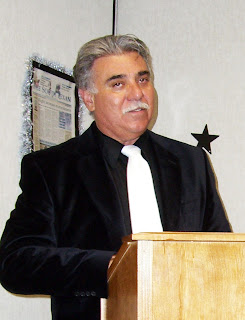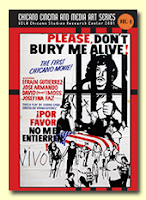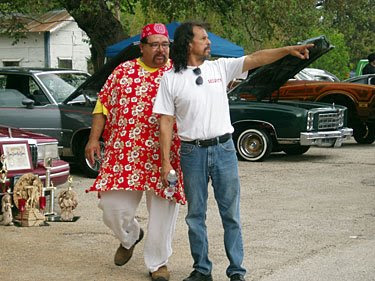
KINGSVILLE - The phone rings in the office of the Texas A&M University-Kingsville student newspaper—The South Texan—on a Monday morning.
Bustling between reading proofs of the week’s newspaper and helping student journalists with the layout and design of the newspaper just hours before deadline, Dr. Manuel Flores, associate professor of journalism, finds himself in familiar territory.
Producing newspapers and meeting deadline have been part of his life for nearly 50 years.
Dr. Flores - a 1966 graduate of Hebbronville High School and grandson Pedro G. Chapa, former editor and publisher of the Jim Hogg County Enterprise - takes a break from the pressure of deadline to take the call.
On the other line is retired TAMUK journalism professor and former sports information director Fred Nuesch.
“We’re making sure The South Texan gets published,” Dr. Flores tells Nuesch.
“Your doing the same thing you were doing 42 years ago,” Nuesch said jokingly to Dr. Flores.
Forty years have passed since Dr. Flores served as a student editor of The South Texan and Nuesch was adviser, but his dedication to TAMUK journalism remains steadfast as he has inherited the role of his old adviser and appointed as Department Chair.
Dr. Flores, who was named Chair of the TAMUK Department of Communication and Theatre Arts June 1, graduated from Texas A&I University with bachelor’s degrees in journalism and political science in 1970. He went on to earn two master’s degrees in the same areas from the university. He earned his doctorate degree in education from Texas A&M Corpus Christi and also did extensive graduate work at the University of North Texas.
His professional career has included more than 13 years of daily newspaper experience (most of it with the Corpus Christi Caller-Times), 11 years in public relations (with Central Power and Light Co.) and more than 18 years teaching journalism in the college and university classroom and advising award-winning collegiate student newspapers at Del Mar College and Texas A&M University-Kingsville.
Flores has presented at several national conventions including several sponsored by the College Media Advisers and Association for Educators in Journalism and Mass Communications. A scholar of Hispanics in the Media, Dr. Flores has also authored a book documenting the history and role of Hispanics in the U.S. media, to be published this summer. Dr. Flores is also a Tejano historian and has toured the state making presentations on the contributions of Tejanos to our state and nation.
Throughout it all, he has remained grateful to the education he received in Hebbronville.
“Hebbronville is just special. There is a strong sense of community that is hard to find elsewhere. The teachers truly cared and the advice you received came from the heart, and not just a paper evaluation. That’s the difference, teaching with heart and passion instead of nagging kids to tell them ‘You should do this and that’,” Flores said.
Flores credits his grandfather, as well as his English and journalism teachers in high school, for helping choose the profession of journalism.
“Mrs. (Pedro) Perez, Mrs. (Maude) Rogers, Mrs. (Josephine) Morris in one way or another had a tremendous impact in my life, either through writing English papers or helping produce or edit the monthly student newspaper (The Longhorn) or yearbook (Corral). It was a great educational experience,” he said. “As for my grandfather, I started working at the Enterprise when I was 10. He gave me my first job as a printer’s devil and later reporter. I own much to him. I have printer’s ink in my blood and once you have that you’re going to be involved with journalism in one way or another.”
Dr. Flores joined the TAMUK faculty in Fall 2006.
Since then, Dr. Flores has been instrumental in a variety of new initiatives for the department which include a sense of cooperation and innovation.
As adviser to The South Texan, Dr. Flores has encouraged cooperative efforts between university’s newspaper and the university’s radio station - KTAI. Both mediums join forces every weekday during the regular semester to bring 91 seconds of campus news to the TAMUK community every half-hour on KTAI. Plans are also to begin student-produced podcasts that will be simulcast on the university’s television station, he said.
Dr. Flores also was key in the joint effort between the Art Department and the Communications-Theatre Arts Department to send students to the regional American Advertising Federation competition.
As chair of the department, Dr. Flores hopes to continue the trend toward growth and development of departmental programs by increasing the use of multi-media technology, continuing to promote cooperation with national organizations, including the AAF and National Association of Hispanic Journalists to increase internship, scholarship and career opportunities for students.
“I want this department to gain state and national recognition so that our students will be able to compete for and accept jobs in today’s media-based society,” Dr. Flores said.
While much has changed both in media and at TAMUK in 40 years, Dr. Flores remains committed to ensuring the department he chairs at TAMUK continues to be a leader in South Texas for producing tomorrow’s media leaders.
“It’s an honor to think I’ve come to a point in my life that I can give back to the institution that prepared me to do well in my profession,” he said. “I also want to extend an invitation to any South Texas area student wanting a career in journalism to contact me or our department at the university.”



